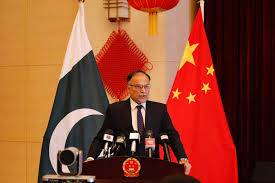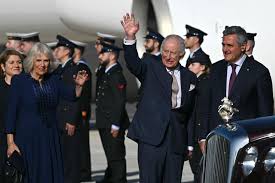China set an example by pulling out 800 million people out of poverty in record time: Ahsan Iqbal

Islamabad: Federal Minister for Planning, Development and Special Initiatives, Ahsan Iqbal said that China pulled 800 million people out of poverty in record time which is an example to follow.
He was addressing a parallel forum on “Promoting Modernization in the Global South: New Pathways, New Vision” during Second High-Level Conference of the Forum on Global Action for Shared Development held in Beijing.
“Addressing inequality, promoting social justice, and ensuring that economic growth translates into tangible improvements in people’s lives as China has demonstrated by pulling 800 million people out of poverty in record time,” he maintained.
Highlighting the use of technology, he that said technology and innovation are key drives of modernization. “However, modernization should not come at the cost of cultural heritage. Embracing modernization while preserving and celebrating our rich cultural traditions can create a unique blend of tradition and innovation that enriches societies by promoting dialogue and collaboration among cultures and civilization instead of conflicts and clashes,” he added. For global and regional integration and collaboration, Iqbal stressed that the Global South must play an active role in the global economy. “By integrating into global and regional value chains, leveraging trade opportunities, and attracting foreign investment, we can drive economic growth and development,” he opined.
According to the World Bank, he mentioned, countries that actively engage in global trade experience growth rates that are 2-3 times higher than those that do not.
The minister emphasised that building resilient communities that can withstand and adapt to various shocks and stresses is essential. Many of South countries are vulnerable to climate disasters.
“This involves enhancing social safety nets, investing in disaster risk reduction, adaptation, and fostering community cohesion,” he said. Iqbal underscored said that 90% of youth lives in the South and are the biggest stakeholders in future and torchbearers of modernization of South, adding empowering young people through education, entrepreneurship, and civic engagement has to be on top of development agenda to ensure a dynamic and innovative future. “Pakistan remains committed to promoting South-South Cooperation so that we can bring fruits of modernization to our people. Each of has success stories, we must work together so these become shared best practices for all of us,” he remarked.
Appreciating the role of the Global Development Initiative (GDI) proposed by Chinese President Xi Jinping, he said that plays a pivotal role in promoting modernization in the Global South.
“By focusing on areas such as poverty alleviation, food security, and green development, the GDI aims to accelerate the implementation of the United Nations’ 2030 Agenda for Sustainable Development, he said. “We should actively advocate for peaceful development and strive to build a world that enjoys lasting peace, universal security, common prosperity, openness and inclusiveness, and is clean and beautiful,” he underlined.
The minister said: “The journey towards modernisation in the Global South is a collective endeavour that requires the concerted efforts of governments, private sector, civil society, and international partners.” Stressing a need to chart a new course and build a better future for all, the minister said that as “we stand at the crossroads of history with the dawn of fourth Industrial Revolution, we are presented with an unprecedented opportunity to redefine our future and reshape our world through innovative pathways and visionary approaches. Pakistan is enabling the new path of economic transformation through 5Es framework by focusing on export, E-Pakistan, environment, energy & equity to make Pakistan $1 trillion economy by 2035.”
Iqbal emphasized that modernization is more than just economic growth and technological advancement and is a holistic transformation that encompasses social, cultural, political, and environmental dimensions.
For the Global South, he contended that modernization means improving the quality of life for all citizens, ensuring sustainable development, and fostering inclusive societies where everyone has the opportunity to thrive with dignity.
Terming technological innovation critical for new pathways to modernization, Ahsan Iqbal said that the digital revolution offers the Global South an unparalleled chance to leapfrog traditional stages of development between 2015 and 2021, 4G network coverage doubled to reach 88% of world population with mobile broadband providing connectivity to internet but 35% have access to internet in developing countries compared to 80% in developed world.
He said increasing 35% to 75% could add $2 trillion to their economies. “Embracing cutting-edge technologies such as artificial intelligence, blockchain, and the internet of things can drive efficiency, transparency, and innovation across various sectors. Providing access to Internet is a basic for development in now economy,” he said.
The minister further said that sustainable development must be at the core of modernization efforts. By 2030, he predicted, the global renewable energy market is projected to reach $1.5 trillion, providing a significant opportunity for the Global South to invest in renewable energy, sustainable agriculture, and green infrastructure.
By doing so, he said: “we can address climate change, reduce environmental degradation, and create resilient communities.” Pakistan, he said, faced the worst climate disaster in 2022 causing damage of US $30 billion to people and economy.
“Most of the countries faced this challenge and we need proactive steps to tackle the challenge of climate change. Stressing upon the imperative of education and skills development, he said that Global South has the biggest bulk of youth in the world. Investing in education and skills development is crucial for equipping our youth with the tools needed to thrive in the new economy in which many of today’s skills are likely to be redundant,” he said.
Currently, he added: “only 34% of young people in low-income countries complete secondary school. Emphasizing STEM education, vocational training, and lifelong learning will empower individuals and boost economic productivity.”
Ahsan Iqbal said that modernization requires inclusive governance structures that are transparent, accountable, and responsive to the needs of all citizens.
Strengthening public institutions for superior service delivery and promoting good governance based on merit and respect for citizens will ensure that the benefits of modernization are equitably distributed and don’t create inequality and exclusion, he added.
Highlighting the importance of regional cooperation, the minister said that the challenges faced by the Global South are often transnational in nature. Strengthening regional cooperation and fostering partnerships can enhance collective resilience, facilitate knowledge sharing, and drive coordinated efforts towards achievement of shared goals, he said.
“We must promote BRI to bring greater regional connectivity for regional cooperation.” Sharing new visions for the future, he observed, “Our vision for modernization must prioritize the well-being and dignity of every individual,” he stated.





